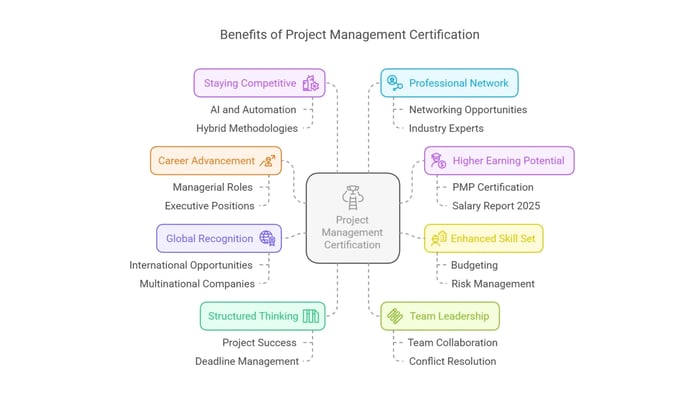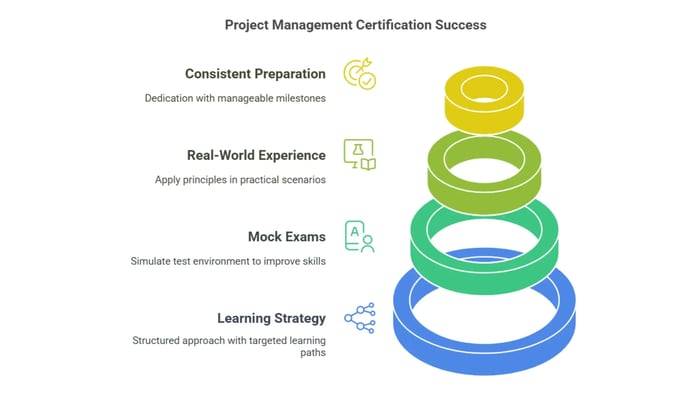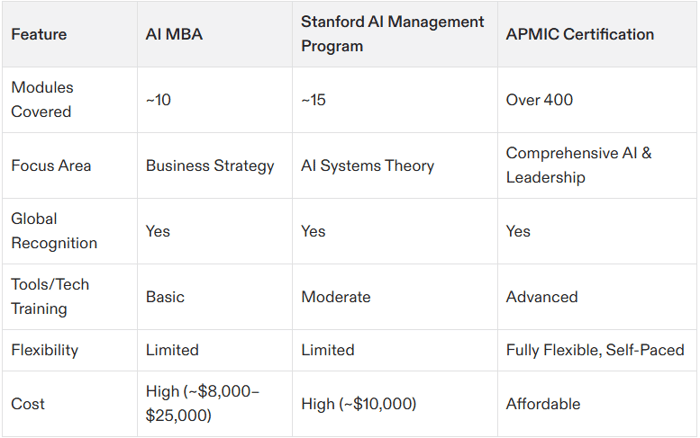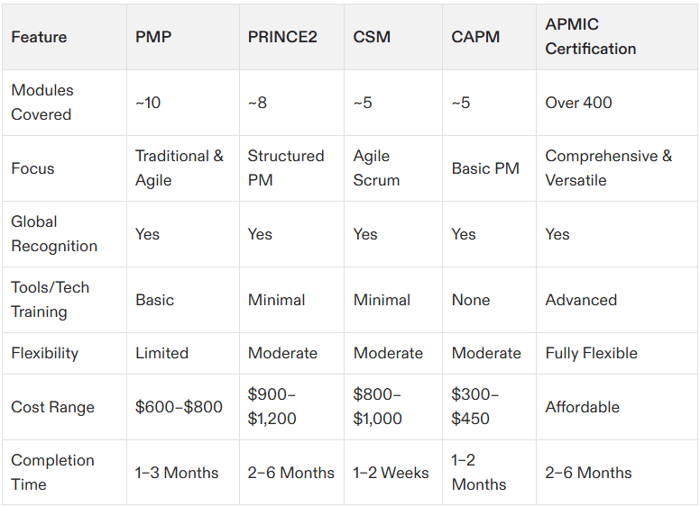Table of Contents
- What is a Project Management Certification?
- The Essential Benefits of Project Management Certification
- 1. Career Advancement Opportunities
- 2. Higher Earning Potential
- 3. Enhanced Skill Set and Expertise
- 4. Global Recognition and Job Security
- 5. Structured Thinking and Improved Execution
- 6. Improved Team Leadership and Collaboration Skills
- 7. Staying Competitive in a Rapidly Changing World
- 8. Building a Strong Professional Network
- 9. Better Project Outcomes
- How to Maximize the Benefits of Project Management Certification
- Final Thoughts
- FAQs – Benefits of Project Management Certification
The business world is evolving rapidly, and professionals must keep up with new trends, methodologies, and technologies to remain competitive. One of the most effective ways to advance your career is by earning a project management certification. Whether you are looking to increase your earning potential, improve your leadership skills, or gain global recognition, a certification in project management offers unparalleled benefits.
But what exactly are the benefits of project management certification in 2025? And why is it more valuable now than ever before? Let’s explore the impact of certifications, their career advantages, and how platforms like APMIC can support you on your journey to professional success.
What is a Project Management Certification?
A project management certification is an official credential that validates your expertise in planning, executing, and overseeing projects efficiently. These certifications, such as PMP (Project Management Professional), CAPM (Certified Associate in Project Management), Agile Certified Practitioner, and others, demonstrate your understanding of industry-standard tools, frameworks, and methodologies.
Industries such as IT, healthcare, construction, and finance increasingly require certified project managers to ensure that projects are completed on time, within budget, and with optimal efficiency. Investing in a certification is an excellent step toward career growth and leadership opportunities.
Now, let’s dive into the benefits of certification in project management and how it can shape your career in 2025. If you want to explore the best certification options, visit the Project Management Certification PMI resource center for insights on industry-recognized credentials.
The Essential Benefits of Project Management Certification
Earning a project management certification is a game-changer for professionals looking to advance in their careers. It validates your expertise, making you a preferred candidate for leadership roles in industries such as IT, healthcare, finance, and construction. Certified project managers tend to earn higher salaries, as companies recognize their ability to deliver projects on time and within budget. Additionally, certification equips professionals with structured methodologies like Agile, Scrum, and Waterfall, enabling them to handle complex projects efficiently.

Another major advantage is the global recognition that certifications like PMP and PRINCE2 provide, allowing you to work with multinational teams and secure international job opportunities. Ultimately, a certification enhances your credibility, builds confidence, and helps you stay competitive in the evolving job market of 2025.
1. Career Advancement Opportunities
One of the biggest benefits of doing project management certification is the ability to fast-track your career. Employers actively seek certified professionals for leadership roles since they are more likely to successfully manage complex projects.
A 2025 industry report from Harvard Business Review found that project managers with certifications are 35% more likely to be considered for managerial and executive positions compared to their non-certified peers. Having a PMP, PRINCE2, or Agile certification on your resume signals that you are a qualified professional ready to take on high-stakes projects.
Pro Tip: Earning a project management certification opens doors to leadership roles. Learn more about career opportunities in the What Can You Do with a Project Management Certification guide.
2. Higher Earning Potential
A certified project manager enjoys higher salary prospects compared to non-certified counterparts. According to the Project Management Salary Report 2025, professionals with a PMP certification earn an average of 22% more than those without certification.
For example, the average salary of a PMP-certified project manager in the United States is now approximately $130,000 per year, while those without certification earn closer to $100,000. This salary premium makes investing in a certification highly rewarding.
3. Enhanced Skill Set and Expertise
Earning a project management certification equips you with an advanced skill set, making you a valuable asset to any organization. These skills include:
Budgeting and Cost Control: Managing project finances effectively.
Risk Management: Identifying and mitigating project risks proactively.
Agile and Waterfall Methodologies: Mastering different project management approaches.
Stakeholder Communication: Enhancing your ability to engage with clients, executives, and teams.
Process Optimization: Streamlining workflows to improve project efficiency.
By gaining expertise in these areas, you set yourself apart from the competition and become indispensable in the workplace.
4. Global Recognition and Job Security
Certifications like PMP, PRINCE2, and Agile are recognized worldwide, allowing professionals to pursue international career opportunities. Many multinational companies now prioritize certified project managers due to their structured approach to handling projects.
As businesses focus more on digital transformation and global expansion, certified project managers are in high demand. 2025 job market trends indicate that companies are increasingly seeking certified professionals to manage hybrid and remote teams efficiently.
5. Structured Thinking and Improved Execution
A project management certification teaches you to think strategically, ensuring you can structure projects logically. This is crucial in preventing project failures, missed deadlines, and budget overruns.
Studies show that certified project managers are 40% more likely to complete projects successfully compared to non-certified managers. This structured approach makes them highly valued by employers and stakeholders.
6. Improved Team Leadership and Collaboration Skills
Leading a successful project requires excellent team management skills. Certified project managers are trained to:
Foster team collaboration and motivation.
Improve communication skills to align teams with project goals.
Resolve conflicts effectively to ensure smooth project execution.
In an era where remote and hybrid work is prevalent, companies are looking for professionals who can lead teams efficiently—a skill that certification programs emphasize.
7. Staying Competitive in a Rapidly Changing World
Project management trends are continuously evolving. AI, automation, and hybrid methodologies are now integral to modern project execution. Certification programs are regularly updated to reflect industry changes, ensuring that certified professionals stay ahead of the curve.
8. Building a Strong Professional Network
Getting certified also provides access to exclusive professional networks. Certification organizations such as PMI (Project Management Institute) offer membership opportunities where you can:
Join alumni networks and forums.
Attend conferences and workshops.
Connect with industry experts and recruiters.
Networking can open doors to exciting job offers and collaborations that non-certified professionals may not have access to.
9. Better Project Outcomes
Organizations prioritize hiring certified project managers because they deliver better results. Research shows that projects led by certified managers are 30% more likely to be completed on time and within budget compared to those managed by non-certified professionals.
How to Maximize the Benefits of Project Management Certification
To make the most of your project management certification, you need a strategic approach to learning and application. Start by selecting the right certification based on your career goals—whether it’s PMP for experienced professionals or CAPM for beginners. Engage with real-world projects to apply what you’ve learned, reinforcing key concepts like risk management, budgeting, and stakeholder communication.

Leverage online platforms like APMIC, which offer mock exams and interactive training to enhance your knowledge. Networking is another crucial step—joining professional groups, attending industry events, and connecting with certified project managers can open doors to career growth. Finally, keep up with emerging trends, such as AI-driven project management and hybrid methodologies, to ensure your skills remain relevant in the ever-changing business landscape.
Tip: According to the Project Management Institute (PMI), certified project managers are significantly more likely to deliver projects on time and within budget.
Create a Learning Strategy
Start with a structured approach to learning. Platforms like APMIC provide targeted learning paths and custom modules to help you master essential concepts.
Utilize Mock Exams
Mock exams simulate the actual certification test environment. APMIC’s practice tests help professionals improve their test-taking skills and increase their success rate.
Gain Real-World Experience
Applying project management principles in real-world scenarios will solidify your learning. Many certification programs, including APMIC, offer interactive case studies and simulations to enhance your practical knowledge.
Stay Consistent with Your Preparation
Certification exams require dedication. Break down your preparation into manageable milestones to ensure steady progress.
Bonus: If you're ready to start your journey, check out the project management certification course at Your Pathway to Career Excellence for expert-led training programs.
Final Thoughts
Earning a project management certification in 2025 is more than just a career move—it’s a step toward financial growth, job security, and professional excellence. Whether your goal is to lead teams, climb the corporate ladder, or transition to a new industry, certification provides the roadmap to success.
Pair your learning with APMIC’s top-tier training resources, and you’re well on your way to unlocking endless opportunities.
Start your certification journey today—your future self will thank you!
FAQs – Benefits of Project Management Certification
Q1. Is a project management certification worth the cost?
Yes! The investment leads to higher salaries, global recognition, and career growth.
Q2. Which industries benefit the most from project management certification?
Industries such as IT, healthcare, construction, aerospace, and marketing prioritize certified professionals.
Q3. Can online resources improve my preparation?
Absolutely! Platforms like APMIC provide 400+ modules, mock exams, and interactive content to boost your success rate.
Q4. What’s the best certification for beginners?
CAPM (Certified Associate in Project Management) is an excellent choice for beginners, while PMP and PRINCE2 are better for experienced professionals.
Q5. How long does it take to earn a project management certification?
The duration varies depending on the certification type. For example, CAPM can take 2-3 months, while PMP may require 6 months or more of study and preparation.





